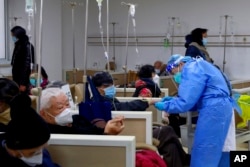China’s foreign ministry pushed back Friday against international reactions and criticism regarding its recent surge in COVID-19 cases, saying the situation was “predictable and under control.”
There has been growing international concern about China’s COVID surge, which followed the government’s move last month to suddenly lift pandemic restrictions that had been among the strictest in the world.
The United States this week joined Britain, France, Canada, South Korea, Spain and Qatar in imposing requirements on travelers from China to show recent negative COVID tests before being allowed to enter. European Union officials were considering similar measures this week.
At a regular news briefing Friday, Mao Ning, Chinese foreign ministry spokesperson, told reporters the new requirements were “unreasonable.” She noted several European countries already had decided not to impose the travel requirements on Chinese visitors, and she asserted EU leaders should be more rational and view China's COVID response in an “objective and fair light."
'True impact' obscured
Officials with the World Health Organization this week criticized China's "very narrow" definition of COVID-19 deaths, warning that official statistics did not show the true reach of the outbreak.
WHO Emergencies Director Michael Ryan said the organization thought that “the current numbers being published from China underrepresent the true impact of the disease in terms of hospital admissions, in terms of ICU admissions, and particularly in terms of deaths."
Mao of the foreign ministry insisted Friday that the country has been sharing all relevant scientific data with the international community "in an open and transparent manner.” She said officials carried out upward of 60 technical exchanges with the WHO and have been sharing the genome data of the virus from the latest COVID cases.
There has also been concern about China’s refusal to use mRNA-based COVID vaccines widely used in Western nations, as well as its refusal to accept the EU's offer to donate the vaccines. Vaccines utilizing messenger RNA are considered more effective than China’s domestically produced vaccines.
VOA’s Mandarin Service reported Friday that health experts from the Pandemic Center at Brown University’s School of Public Health and the Georgetown University Institute for National and Global Health Law weighed in on China’s COVID-19 surge.
In separate written comments to VOA Mandarin, the officials said that while the testing requirements being imposed by world governments likely would do little to prevent the spread of the virus that causes COVID-19, they understood the political desire to put up some barriers.
In addition, they each questioned China’s decision to refuse mRNA vaccines, saying it had nothing to do with science and more likely was made because they did not want to admit their own vaccines were not as effective.
Change 'would be wise'
Jennifer Nuzzo, professor of epidemiology and director of the Pandemic Center at Brown, told VOA that “given recent, significant changes in how China is conducting surveillance for COVID-19 cases, hospitalizations and deaths, it is near impossible to accurately assess the trajectory of China's outbreak. The WHO recently criticized China's efforts to redefine its COVID metrics, implying that these changes may be masking the full extent of its outbreak.”
Lawrence Gostin, director of the O’Neill Institute for National and Global Health Law at Georgetown University, echoed Nuzzo’s admonition, saying that “China would be wise to deploy Western vaccines, especially mRNA vaccines, which are more effective than Chinese vaccines. China's refusal to do so has nothing to do with science and everything to do with politics. China simply does not want to admit that its vaccines are not as effective as in the West.”
“It would be foolhardy to think China's COVID outbreak has reached its peak,” Gostin noted. “As we know from COVID-19, there will continue to be surges in cases, hospitalizations and deaths. Because China's population has very little natural immunity, the outbreak will get far worse before it gets better.”
VOA Mandarin Service reporters Jessie Jiang and Jie Xi contributed to this report. Some information came from The Associated Press, Reuters and Agence France-Presse.






